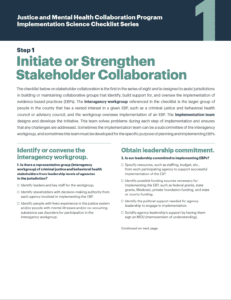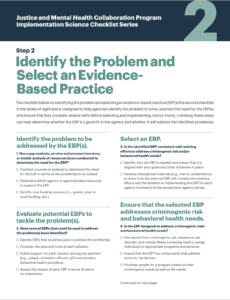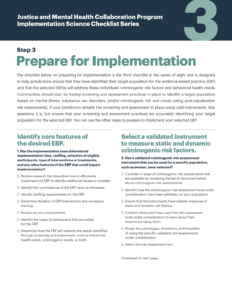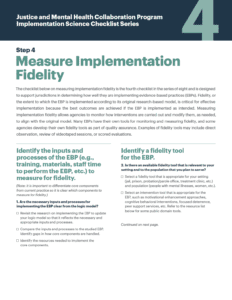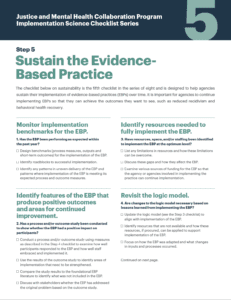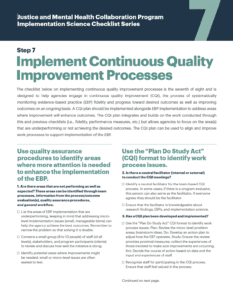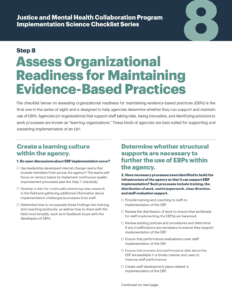Justice and Mental Health Collaboration Program Implementation Science Checklist Series
Criminal justice and behavioral health agencies are increasingly adopting evidence-based practices (EBPs) to advance behavior change among the people they serve. While EBPs can help reduce recidivism and improve public health and safety, their success is often hindered by lack of capacity to implement them properly. But as people who have behavioral health needs continue to encounter criminal justice and behavioral health systems across the country, there is a greater need to ensure that these EBPs are implemented with fidelity.
By taking a research-based approach to implementation, known as implementation science, agencies can improve or strengthen the EBPs they deliver for people in the criminal justice system who have behavioral health needs.
The implementation science checklist series is intended for professionals who direct and oversee programming in the fields of corrections, community corrections, behavioral health, and social service agencies. The collection of eight checklists will help you assess your agency’s evidence-based practice implementation efforts and use a research-based approach to ensure that investments in evidence-based practices yield desired outcomes.
It can be beneficial to follow the checklists sequentially, but your agency should start with the checklist step that reflects your current needs and progress. Then, determine whether your agency is following the numbered action items in each checklist by answering the items that accompany them. Revisit the checklists every 6 to 12 months to evaluate progress and identify continued areas of focus.
Step 1: Initiate or Strengthen Stakeholder Collaboration
Step 2: Identify the Problem and Select an Evidence-Based Practice
Step 3: Prepare for Implementation
Step 4: Measure Implementation Fidelity
Step 5: Sustain the Evidence-Based Practice
Step 6: Master the Core Competencies
Step 7: Implement Continuous Quality Improvement Processes
Step 8: Assess Organizational Readiness for Maintaining Evidence-Based Practices
Supporting Research and Additional Information
For more information on implementation science, the research base supporting this science, and how the elements of implementation science apply to criminal justice and behavioral health systems, consider the following resources:
- Evidence-Based Practices from the National Institute of Corrections is a collection of resources on EBPs for the criminal justice system and tips for successful implementation of these EBPs.
- Evidence-Based Practices Research Center from the Substance Abuse and Mental Health Services Administration provides informational resources on various EBPs that address behavioral health.
- Implementation Research: A Synthesis of the Literature summarizes the research literature on implementation across fields.
- Implementation Science: Moving from Theory to Sustainability provides approaches to strengthen quality improvement and sustainability of EBPs.
- Implementation Science Toolkit: Equipping Justice Agencies with the Tools to Facilitate the Change Process provides strategies to help practitioners learn to adopt and adapt EBPs and treatments for their agency and ultimately improve agency outcomes.
- Solving Puzzling Probation Problems with PDSA provides the background and evidence supporting the use of “Plan Do Study Act” (PDSA) and uses community corrections examples to translate ideas for the justice field.
- What Strategies Are Used to Build Practitioners’ Capacity to Implement Community-Based Interventions and Are They Effective?: A Systematic Review [file download] contributes to further development of the Evidence-Based System of Innovation Support by systematically reviewing empirical studies of capacity-building interventions.
This project was produced in collaboration with the Center for Advancing Correctional Excellence at George Mason University and was supported by Grant No. 2019-MO-BX-K001 awarded by the Bureau of Justice Assistance. The Bureau of Justice Assistance is a component of the Department of Justice’s Office of Justice Programs, which also includes the Bureau of Justice Statistics, the National Institute of Justice, the Office of Juvenile Justice and Delinquency Prevention, the Office for Victims of Crime, and the SMART Office. Points of view or opinions in this document are those of the author and do not necessarily represent the official position or policies of the U.S. Department of Justice.











